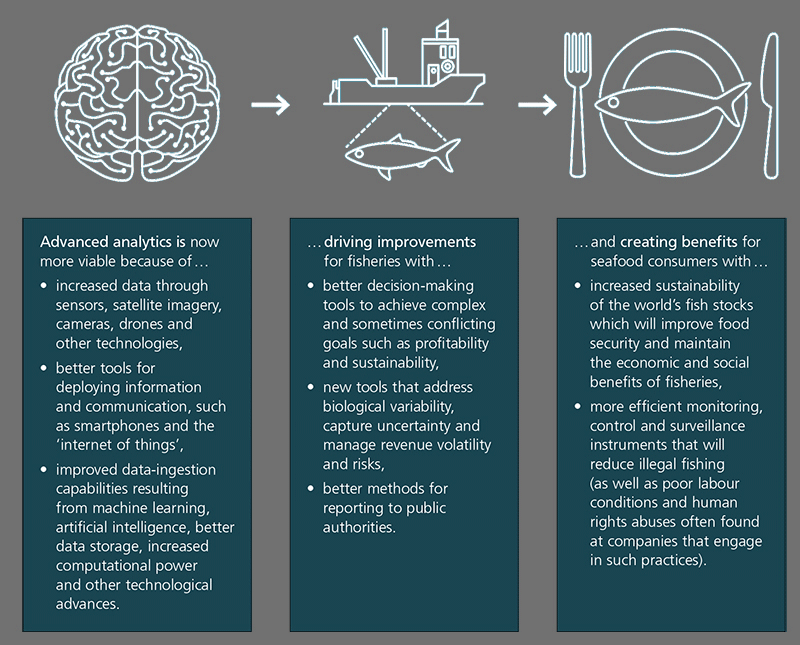![]() Technology is changing the way people live, work and relate to one another. some of these ‘new technologies’ present opportunities for fishing and aquaculture to easily combine and analyse data to make decisions that reduce costs and increase benefits. Commercial wild-catch fishers will have access to data previously unavailable, including near real-time information on:
Technology is changing the way people live, work and relate to one another. some of these ‘new technologies’ present opportunities for fishing and aquaculture to easily combine and analyse data to make decisions that reduce costs and increase benefits. Commercial wild-catch fishers will have access to data previously unavailable, including near real-time information on:
- gear performance and efficiency,
- costs and usage of energy and other inputs,
- behaviour and distribution of target species,
- markets and prices.
In aquaculture, new technologies already mean that operators can remotely monitor:
- stock health and welfare,
- feed efficiency,
- disease incidence,
- responses of fish to medicine and treatment.
These new technologies are called ‘advanced analytics’ (see Figure 4). They allow for automated collection and analysis of large datasets that translate into tools for decision making. Implementing advanced analytics in Australian fishing and aquaculture means that all sectors could conduct their activities ‘smarter’ and add value to their products. In addition to the economic and social benefits, these technologies can be used to improve ecosystem health. all fishing and aquaculture sectors, including managers, must be open to change to make the most of these decision-support tools.
Falling technology costs are making broadscale adoption of advanced analytics in Australian fishing and aquaculture more affordable. Increased collaboration across sectors and industries should also motivate the uptake of advanced analytics across fishing and aquaculture.
The FRDC will explore how to invest in, manage and promote adoption of R&D to:
- encourage collection and sharing of data to support advanced analytics that will benefit fishing and aquaculture and the community,
- work towards building trust and confidence in digital technologies and data,
- support the development of systems and tools,
- contribute to a series of cross-disciplinary ‘lighthouse projects’ showing how advanced analytics can help transform Australian fishing and aquaculture.
Increased capacity for data-driven decision making will provide opportunities for all stakeholders.
- Fishers and aquaculturists will be able to fine-tune their operations to reduce costs and maximise benefits, including profit (R&D Plan Outcome 1).
- Fisheries managers will be able to address environmental and social impacts, and fishers and aquaculturists will be able to show best practice (R&D Plan Outcome 2).
- Post-harvest operators will be able to benefit from increasingly transparent and controllable supply chains (R&D Plan Outcome 5).
- Researchers will be able to access large volumes of data on markets, consumer choices, fish stocks and ecosystems (all R&D Plan Outcomes).
- Managers will have capacity to flexibly and responsively integrate biological and commercial imperatives into decision making (R&D Plan outcomes 1 and 4).


